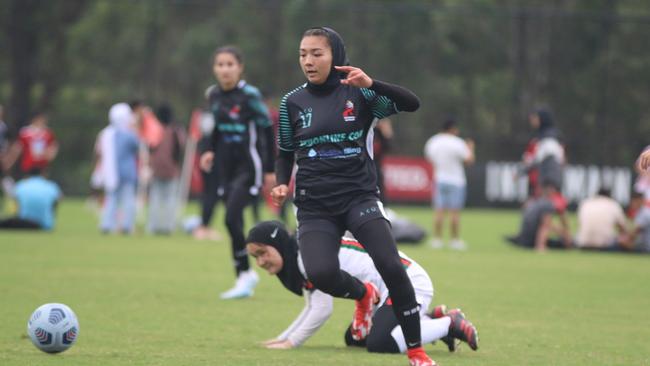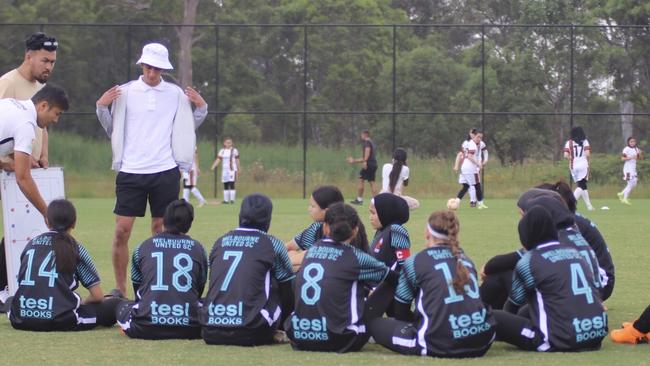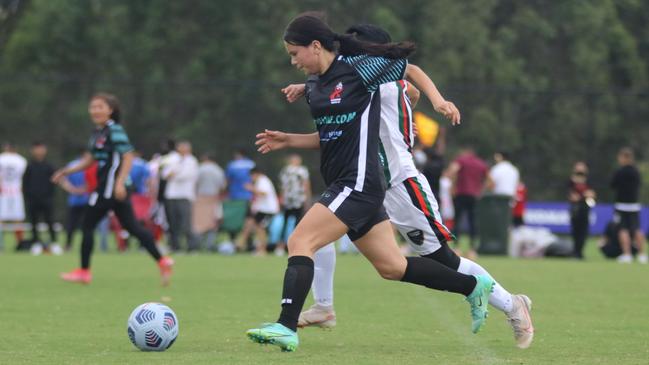The football tournament welcoming Afghan refugees
Leaving behind gunfire and turmoil, a group of Afghanistan’s best footballers have found a place to play the sport they love on Australian soil.

Football
Don't miss out on the headlines from Football. Followed categories will be added to My News.
Beside a particularly straight stretch of Sydney’s M4 Motorway, a soccer tournament began.
It carried all the calling cards of a day spent at suburban sport – Eskies and prams on the sidelines, overly zealous match officials, field markers strewn about the place.
But scattered among five of the teams competing were roughly 20 resilient women sending a message to a broken nation.
In mid-August, as the Taliban took Kabul, the international sporting community became worried about this particular group of elite athletes – known worldwide as activists and symbols for equality.
The sports women had feared for their lives and their futures under the Taliban, which has reimposed harsh restrictions on women, including a strict ban on participation in sport.
With their lives in danger, the group – with the support of some prominent Australians – fled the country and arrived on Aussie soil.
This week, the athletes reunited with other members of their community at the Afghan National Cup, a five-day annual round robin tournament played at Wanderers Football Park in Blacktown.
The players, most of whom decided against being fully identified over safety concerns, have previously spoken about their dramatic exit from Kabul amid bombings and gunfire.
But today, they are speaking of football – and this tournament – as a means of feeling Australian.

Asma – a fan of the game and regular at the tournament – was one of those that sprung into action to make it all happen.
“I’m really passionate about using football as a vehicle for social integration,” she told News Corp.
And as Asma explained, soccer is the sport of choice in her native Afghanistan, rivalled only by cricket in its popularity.
Asma said most of the female athletes who recently evacuated Afghanistan were looking forward to their new futures but still feared for their families and former teammates back home.
Asma continued: “I was asking myself, ‘How can I play my role?’ I couldn’t do much for the people back in Afghanistan but the thing I was able to do was support the newly-arrived Afghans.”
Asma knows something of what this year has been like for those refugees.
Completely aware of the risks, Asma’s father travelled thousands of kilometres by boat to Australia in the early 2000s with a simple dream in his heart: to give his young family a better life.
Seven years later, the family was finally reunited on Australian soil.
“It was a feeling that you could never forget,” Asma said.
For Asma, it was through playing soccer that she came to feel Australian.
“Football helped me to be able to learn the language, make friends and socialise. That was how I learned English,” she said.
Now, Asma is hoping to give young Afghan girls the same opportunity and there has been no shortage of people willing to put everything on hold to help her realise that vision this week.
Whether it’s been the A-League’s Western Sydney Wanderers, who lent the Afghan National Cup their training facilities, Murray’s Buses, who drove the teams hundreds of kilometres to the tournament at cost price, the law firm KHQ or the non-profit organisations Women Onside, of which Asma is a board member, and Football United, Aussies have rolled up their sleeves and pitched in.
One of Women Onside’s volunteers, former Matilda Moya Dodd, has been eager to lend a hand.
“Quite a lot of the Matildas alumni got involved with supporting the players in quarantine when they first arrived in Australia,” she explained.
“In the tournament, (Women Onside) is providing ground support for teams who’ve come from outside Sydney, things like making sure they’ve got Eskies, ice, shelter, whatever teams on the road need as they travel.”

Moya believes the tournament’s significance goes beyond what could ever take place on the pitch.
“It’s hard to imagine a more difficult year for the Afghan community than the one that’s just gone,” she said.
“I think it means everything to be able to come together and enjoy some football, but most of all, to enjoy a sense of community.
“It’s great to feel that sense of support that the Australian football community wants to give to migrant and refugee communities.”
Thanks to that support, the competition has continued to gather momentum.
The inaugural Afghan National Cup had only two women’s teams, but at the fifth this year, there were five.
“After the tournament finishes, the girls are still excited,” Asma said.
“This event is one of the events that every player looks forward to.”
Asma hopes that as the competition keeps growing, opportunities to play the game professionally will begin to open up for the female athletes taking part.
“That’s something that I’m really passionate about and advocating for,” she said.
“We’ve got some players who’re obviously very talented, but unfortunately, there are very limited opportunities for the girls to be able to reach the next stage.
“My dream is to hopefully see some of our girls representing the Matildas one day.”
Originally published as The football tournament welcoming Afghan refugees


